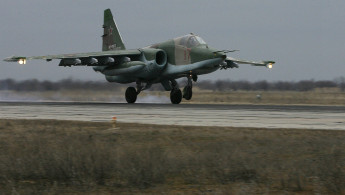Syria: Increased Saudi support for rebels offsets Russian airstrikes
At least 11 civilians died in suspected Russian airstrikes in Idlib province on Sunday while increased Saudi support for the rebels has meant recent Syrian government campaigns are progressing slower than expected, experts said.
Russian airstrikes have hit rebels fighting Syrian government forces in the provinces of Aleppo, Idlib and Hama hard.
The Russian strikes have reportedly boosted morale among government troops, but gains from regime offensives backed by the airstrikes have been more modest that expected, two senior sources close to the Syrian government told Reuters on Friday.
This was because Saudi Arabia had increased its military support for the rebels, they said.
US anti-tank missiles
Increased numbers of TOW anti-tank missiles were a significant factor in this, said the sources, which Reuters did not name but said neither were Syrian.
One source said TOW missiles were the reason the regime offensive in the stategically important Sahl al-Ghab plain had been called off.
"The support from Saudi Arabia for the opposition did not stop but it is now intensified in an unprecedented way, and it is this that has participated in slowing the operations, delaying big achievements on the ground," the other source said.
TOW missiles are steered optically and guided by wire. They have a range of up to four kilometres and carry a armour-piercing shaped charge of up to six kilograms in weight.
TOW missiles were seen in rebel hands Syria as early as April 2014, but the numbers of missiles seen increased dramatically in May 2015. The missiles have been supplied to battalions of the Free Syrian Army, and only a few missiles are given to any rebel group at one time. These groups are required to account for these missiles, videoing their use and returning spent missile casings.
Though the missiles most likely come from Saudi Arabia's stockpile, the supply of US-made weapons to any third party must be approved by the US.
Two years ago Saudi Arabia placed an order for 15,000 anti-tank missiles at a cost of over $1 billion, Foreign Policy reported. According to the International Institute for Strategic Studies, Saudi's existing stockpile of anti-tank missiles at the time was a mere 4,000.
The TOW missiles are not the only anti-tank weapons available to Syrian rebels. They have also captured significant numbers of anti-tank missiles of various kinds from Syrian regime forces.
However, the TOW missiles are likely to be the most widely available, at least to rebel forces operating under the umbrella of the Northern and Southern Military Operations Commands.
Suspected Russian airstrikes kill civilians
Meanwhile, suspected Russian airstrikes killed nine people, including a child, in the town of Maaret al-Numan, and two women in Saraqib on Sunday, the Syrian Observatory for Human Rights reported.
Idlib province fell from government control earlier this year and is held largely by Jaish al-Fatah ("the Army of Conquest") rebel alliance, which includes al-Qaeda affiliate the Nusra Front.
The alliance has been targeted by Russian aircraft and Syrian ground troops just across the provincial border in neighbouring Hama province.
Elsewhere on Sunday, at least 10 people were killed in Syrian government air strikes on a town held by the Islamic State group in northern Aleppo province.
A woman and child were among the dead in the strikes on al-Bab, which has been held by the IS since early 2014, the Observatory said.
Another four people, including a child, were killed in rebel fire on the government-held area of Aleppo city, the monitor said.
South of the city, meanwhile, government troops backed by Russian air strikes seized several villages from rebel forces, state news agency SANA said.
It reported the army had taken three villages south of Aleppo, with the Observatory confirming the advance.
French warplanes strike IS oil facility in Syria
In another development, the French army on Sunday bombed an oil supply centre held by the Islamic State group (IS) in eastern Syria, Defence Minister Jean-Yves Le Drian announced on Monday.
"We intervened in Syria... yesterday evening with a strike on an oil supply centre near Deir Ezzor on the border between Iraq and Syria," Le Drian told journalists on the sidelines of a forum on African peace and security in Dakar, Senegal.





 Follow the Middle East's top stories in English at The New Arab on Google News
Follow the Middle East's top stories in English at The New Arab on Google News

![Israeli forces ordered bombed Gaza's Jabalia, ordering residents to leave [Getty]](/sites/default/files/styles/image_330x185/public/2176418030.jpeg?h=a5f2f23a&itok=_YGZaP1z)
